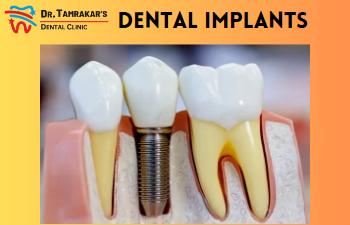Dental implants are a popular and effective solution for replacing missing teeth. They are titanium posts that are surgically placed into the jawbone to act as a replacement for the tooth root. Once the implant has fused with the jawbone, a dental crown, bridge, or denture can be attached to the implant to replace the missing tooth or teeth. The process of getting a dental implant typically involves several stages, including a consultation, examination, and planning stage, followed by the surgical placement of the implant. After the implant has been placed, a healing period is necessary to allow the implant to fuse with the jawbone. This process is known as osseointegration and can take several months. Once the implant has fused with the jawbone, a dental crown or other restoration is attached to the implant to replace the missing tooth or teeth. Dental implants are a long-lasting solution that can provide many benefits, including improved appearance, improved speech, improved comfort, and improved oral health. However, not everyone is a suitable candidate for dental implants. Factors such as overall health, oral health, and bone density can affect the success of dental implant surgery. It's important to consult with a dental professional to determine if dental implants are a suitable option for your individual needs


